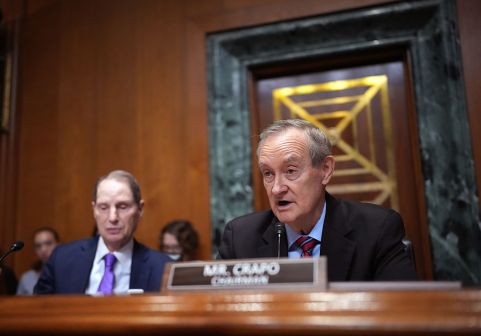In the age of DOGE, new venture aims war chest at government efficacy

As the partisan divide over what it means to improve government has increasingly deepened, one new nonprofit — boasting buy-in from both sides of the aisle — aims to raise and funnel $120 million into state and federal efforts to build state capacity.
The new Recoding America Fund — so-named for a book written by Obama-era technology leader Jennifer Pahlka — officially launched last week with a six-year mission to improve government services for Americans with strategic investment. While the venture is spearheaded by Pahlka, who sits on its board, the organization’s leadership includes former staff for Democrats and Republicans alike.
Building that “cross-ideological effort” has been a core part of the organization from the beginning, Anne Healy, the fund’s CEO and a former U.S. Agency for International Development economist, told FedScoop in an interview.
The team might not share the same views on every issue, Healy said. But when it comes to something like catalyzing “digital transformation in a really meaningful and sustained way in a government entity, those are issues we can really agree on and that serve a number of different policy objectives.”
At the heart of the venture is a focus on improving the underlying capacity — or what Healy described as “effective plumbing” — that various policies and their outcomes rely upon. For the fund, that plumbing spans four pillars: Attracting and retaining talent, having employees focused on the “right work,” building and purchasing “purpose-fit” technology, and applying a “test-and-learn” approach to implementation of plans that allows for adjustment.
Of course, the new effort is set against the backdrop of President Donald Trump’s Department of Government Efficiency (DOGE) group that has applied a scorched-earth approach in its pursuit to shape the same areas within the federal government.
Incentivized resignation and retirement programs and agency reductions in force have led to the separation of tens of thousands of workers, and realignments for those who remain. Meanwhile, DOGE has sought to cut contracts and grants and capitalize on certain efforts to improve government services. Its work has resulted in pushback from the left, federal workers, and their allies who say the group is damaging the federal ecosystem.
But Recoding America Fund has not criticized the work of the DOGE. Instead, its leaders have marked the current moment as an opportunity.
In her post announcing the initiative last week, Pahlka described DOGE as “moving the Overton window for the speed and scale of change.”
“We embrace the political realignment that has made state capacity not only a prime time issue, but a common cause for what might in the past have seemed strange bedfellows,” Pahlka said later in her post. “We are committed to working not only across the aisle but with leaders who have a wide diversity of ideologies that recognize the importance of this work and no longer tolerate the status quo.”
Healy declined to comment specifically on the efficiency group, but acknowledged the “massive disruption” to the environment the fund is entering, specifically pointing to federal workforce cuts, reductions in federal and state budgets, and the proliferation of AI tools changing the way governments operate.
“What we’re really trying to harness is the opportunity that this disruption creates,” Healy said. She added later: “It’s an opportunity for building government better — radically better — not incrementally better.”
$120 million, six years
To build a radically better government, the fund is in the process of raising its war chest. While it has early backing from Arnold Ventures, Alta Futures, Packard Foundation, and others, Healy said, it still has “significant fundraising to do toward” its $120 million target.
The fund hopes that early success will attract “interest from and commitments from donors who might be new to this space” and see their interest areas benefiting from investment in the plumbing that supports that work within governments, Healy said.
The venture will also be racing against a self-imposed time crunch. A six-year timeline is intended to ensure that the fund outlives the current political moment and reinforces urgency. The timeline creates both “internal discipline” and an external signal “that we’re not here to build an empire,” Healy said.
Rather, the goal is to “nimbly serve as an accelerator in this ecosystem where there’s already a lot of really important work happening, but we want to sort of create an engine that can further accelerate that to take advantage of the moment we’re in,” she said.
As far as what that money will go toward, Healy said the fund anticipates supporting a wide variety of organizations. An example of that could be backing an organization that’s positioned to help a state government partner transition to an improved approach to IT operations.
“We’re really hoping to demonstrate that relatively small investments of highly flexible philanthropic dollars can catalyze transformative change in government,” she said.
Creating impact
While the fund also envisions federal impact, so far much of its movement has been in states.
Robert Gordon, a former assistant secretary at the Department of Health and Human Services who’s leading the fund’s state government initiatives, said he plans to begin by working with governor’s offices and “organizations that are supporting states.” He did not name which states the fund will target first, but said the fund will begin disclosing its early work “soon.”
When asked to describe precisely how the fund will seek to advance its goals, such as ensuring that government is placing “the right people” to do “the right work,” he said the answer will depend on the priorities of each governor’s office. He also pointed to the product operating model, a schema advocated for by Pahlka and Ann Lewis, a former General Services Administration director, that prefers rapid iteration led by longstanding product teams, rather than one-off projects.
“Governments are beginning to adopt this model and that’s great, but there’s a lot we can do to accelerate their adoption,” Gordon said. “There’s two core dimensions to the work. There’s some direct support for state governments and then a lot of grant-making. It’s a fund, and so we’re looking to support organizations to build a field of organizations that can support states beyond what we can do.”
Michael Leahy, Maryland’s former chief information officer, applauded the new fund, but said he would reserve judgement until the full contours of its work were revealed.
Leahy said government agencies work hard at “hiding the ball” — that is, pretending they operate “efficiently and without error rather than acknowledging that like the rest of us, they make mistakes and experience failure.” Identifying the right people, the right work and the right operating model to solve such issues, he continued, is further challenged by the varying definitions people have of what “right” means.
“They say they want to fix the world and that’s grand,” Leahy said of the fund’s organizers, “but I’d like a little more discussion of what the actual problems are they want to tackle and how they plan to tackle them.”
Bipartisan leaders
Whether the fund can eventually meet its ambition of redesigning government will depend on its politically diverse leaders.
Its advisory council includes Dean Ball and Ben Buchanan, who served as White House AI advisers under Presidents Trump and Biden, respectively. Meanwhile, its immediate team includes Victoria Houed, who was an AI policy leader at the Department of Commerce during the Biden administration and a former fellow in the office of then-House Speaker Nancy Pelosi, D-Calif.; Laurent Crenshaw, who was a senior House GOP staffer for a decade, serving the chamber’s Republican Conference, Republican whip, and Rep. Darrell Issa, R-Calif.; and Lauren Lombardo, most recently deputy policy director on the House Committee on Oversight and Government Reform and a fellow for former Sen. Ben Sasse, R-Neb.
The fund’s optimism on bipartisanship, however, is at odds in a year when the parties seem to be drifting further apart, and during a political standoff that has resulted in a weekslong government shutdown. When pressed on the realism of bipartisan cooperation, Gordon stood behind the optimistic view.
“I think at the state level, there’s more consensus than you might think about what people want from government,” he said. “They want a fast and efficient DMV experience. They want when they need a business permit or a government license or they want to take their family to the state park on the weekend, they want that process to go well. They want their highways in good repair. And I could go on.”
Neither party has a monopoly on wisdom, Gordon said. And it seems the fund intends to mine the best ideas from wherever it can find them.
“Goals depend on policies, and maybe Democrats and Republicans disagree about those policies, but those goals also depend on having the right operating systems, the right ways to attract and retain talent, the right digital services, procedures that enable government to execute in a timely and cost-effective way. And those are going to be our areas of focus.”
The proof of that concept will be in their outcomes.
“For specifics, judge us by our work,” Gordon said. “It’s our second week.”






